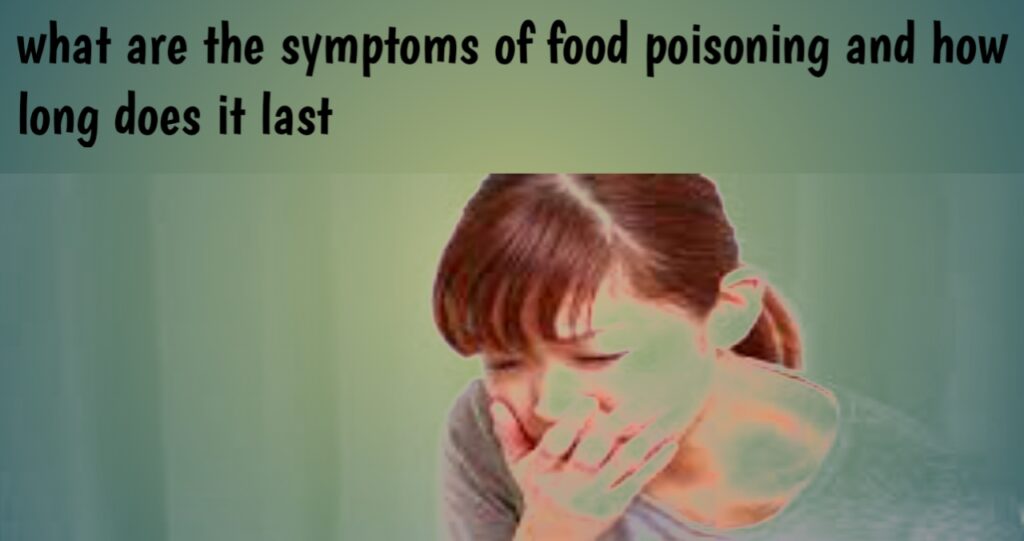
The symptoms of food poisoning can vary depending on the type of bacteria, virus, or parasite that has contaminated the food. However, common symptoms may include:
Nausea
Vomiting
Diarrhea
Abdominal pain or cramps
Fever
Headache
Fatigue
Muscle aches
These symptoms can appear within a few hours to a few days after consuming contaminated food.
The duration of food poisoning also varies depending on the specific cause and individual factors such as overall health and immune system strength. In most cases, symptoms of food poisoning last anywhere from a few hours to several days. However, severe cases or those caused by certain pathogens may require medical attention and can last longer. It’s important to stay hydrated and seek medical help if symptoms persist or worsen.
এক পলকে
how long does food poisoning last in adults food poisoning treatment
The duration of food poisoning in adults can vary depending on the cause, severity of symptoms, and individual factors. In many cases, symptoms of food poisoning typically last from a few hours to several days. Most people recover from food poisoning without medical treatment, but severe cases may require medical attention.
Here are some general guidelines for managing food poisoning:
Stay hydrated: It’s crucial to drink plenty of fluids to replace fluids lost through vomiting and diarrhea. Oral rehydration solutions or electrolyte-rich drinks can help replenish lost electrolytes.
Rest: Get plenty of rest to allow your body to recover.
Avoid certain foods: Stick to bland, easy-to-digest foods like crackers, toast, bananas, rice, and boiled potatoes until your symptoms improve.
Over-the-counter medications: Anti-diarrheal medications like loperamide (Imodium) may help alleviate diarrhea, but it’s essential to consult a healthcare professional before taking any medications, especially if you have other medical conditions or are taking other medications.
Seek medical attention if necessary: If your symptoms are severe, persistent, or accompanied by signs of dehydration (such as dizziness, decreased urination, or extreme thirst), it’s important to seek medical attention promptly. In some cases, particularly if you’re at higher risk due to age or underlying health conditions, medical treatment may be necessary to prevent complications.
Remember that prevention is key to avoiding food poisoning. Practice good food safety habits, such as properly storing, cooking, and handling food, to reduce the risk of contamination. If you suspect that you or someone else has food poisoning, it’s essential to identify and avoid the contaminated food and to report the incident to the appropriate authorities if necessary.
can you have food poisoning without vomiting
Yes, it is possible to have food poisoning without experiencing vomiting. Vomiting is one of the common symptoms of food poisoning, but not everyone with food poisoning will necessarily vomit.
The symptoms of food poisoning can vary widely depending on the type of pathogen involved, the amount of contaminated food consumed, and individual factors such as age and overall health. Other common symptoms of food poisoning include diarrhea, abdominal pain or cramps, nausea, fever, headache, and muscle aches.
Some people may only experience mild symptoms or may have symptoms that primarily affect the digestive system without vomiting. In other cases, symptoms may be more severe and include vomiting along with other symptoms.
If you suspect you have food poisoning or are experiencing any symptoms that concern you, it’s essential to seek medical advice for proper diagnosis and treatment.
how long food poisoning last
The duration of food poisoning can vary widely depending on several factors, including the type of pathogen involved, the amount of contaminated food consumed, individual factors such as age and overall health, and whether medical treatment is sought. In general, food poisoning symptoms typically last from a few hours to several days.
Milder cases of food poisoning may resolve on their own within a day or two, while more severe cases may last longer and require medical attention. Some types of food poisoning, such as those caused by certain bacteria or parasites, can lead to more prolonged or severe symptoms and may require medical treatment to manage complications.
If you suspect you have food poisoning or are experiencing symptoms such as nausea, vomiting, diarrhea, abdominal pain, fever, or dehydration, it’s essential to seek medical advice for proper diagnosis and treatment. Additionally, staying hydrated and resting can help support your body’s recovery process.
how long does food poisoning take to kick in
The onset of symptoms of food poisoning can vary depending on several factors, including the type of pathogen involved, the amount of contaminated food consumed, individual factors such as age and overall health, and the specific food item ingested. In general, symptoms of food poisoning can begin anywhere from a few hours to several days after consuming contaminated food.
For some types of foodborne pathogens like Staphylococcus aureus or Bacillus cereus, symptoms may develop within a few hours after eating contaminated food. Other pathogens, such as Salmonella or E. coli, may have a longer incubation period, with symptoms appearing within one to three days or even longer after exposure.
It’s important to note that the onset of symptoms can vary widely among individuals and may depend on factors such as the amount of contaminated food consumed and the person’s overall health and immune system function.
If you suspect you have food poisoning or begin experiencing symptoms such as nausea, vomiting, diarrhea, abdominal pain, fever, or dehydration, it’s essential to seek medical advice for proper diagnosis and treatment. Identifying and treating food poisoning early can help prevent complications and support your body’s recovery process.
what are the 1st signs of food poisoning
The first signs of food poisoning can vary depending on the specific pathogen involved, the amount of contaminated food consumed, and individual factors such as age and overall health. However, common initial symptoms of food poisoning may include:
Nausea: Feeling queasy or experiencing an upset stomach may be one of the earliest signs of food poisoning.
Vomiting: Some people may experience vomiting shortly after consuming contaminated food.
Diarrhea: Watery or loose stools may develop soon after consuming contaminated food.
Abdominal pain or cramps: Pain or cramping in the abdominal area may occur as the body reacts to the presence of harmful bacteria, viruses, or toxins in the digestive system.
Fever: A mild to moderate fever may accompany food poisoning, especially if the body is mounting an immune response to the pathogens.
These symptoms can vary in severity and may develop rapidly or gradually depending on the specific circumstances. It’s important to note that not everyone who consumes contaminated food will necessarily experience all of these symptoms, and the onset and severity of symptoms can vary widely among individuals.
If you suspect you have food poisoning or begin experiencing symptoms shortly after consuming food, it’s essential to seek medical advice for proper diagnosis and treatment. Prompt identification and treatment of food poisoning can help prevent complications and support your body’s recovery process.
mild food poisoning symptoms
Mild food poisoning symptoms can vary depending on the specific pathogen involved and individual factors, but they often include:
Nausea: Feeling queasy or having an upset stomach.
Mild abdominal discomfort or cramps: Occasional discomfort or mild cramping in the abdominal area.
Diarrhea: Passage of loose or watery stools, typically occurring a few times but not persisting for an extended period.
General malaise: Feeling unwell or fatigued but still able to carry out daily activities.
Mild fever: A slight increase in body temperature, usually not exceeding 100.4°F (38°C).
These symptoms are generally manageable and may resolve on their own within a day or two without requiring medical treatment. However, it’s essential to monitor symptoms closely and ensure adequate hydration, especially in cases of diarrhea or vomiting. If symptoms worsen or persist, medical attention may be necessary. Additionally, if you have any underlying health conditions or are at increased risk of complications, it’s advisable to consult a healthcare professional for guidance.
food poisoning medication
There isn’t a specific medication for food poisoning itself, as treatment typically focuses on managing symptoms and supporting the body’s natural healing process. However, depending on the severity of symptoms, your doctor may recommend certain medications or treatments to help alleviate discomfort and prevent complications. Here are some common approaches to managing food poisoning:
Fluid replacement: Dehydration is a common concern with food poisoning due to vomiting and diarrhea. Drinking plenty of fluids, such as water, clear broth, or oral rehydration solutions, can help replace lost fluids and electrolytes. In severe cases of dehydration, intravenous (IV) fluids may be necessary.
Anti-diarrheal medications: Over-the-counter medications like loperamide (Imodium) may help reduce diarrhea symptoms by slowing down bowel movements. However, these medications are not suitable for everyone and should be used with caution, especially if you have certain underlying health conditions or if you suspect the diarrhea is caused by a bacterial infection like Salmonella or E. coli.
Anti-nausea medications: Medications such as ondansetron (Zofran) may be prescribed to help relieve nausea and vomiting, especially if these symptoms are severe or persistent.
Antibiotics: Antibiotics are generally not recommended for most cases of food poisoning, as they are ineffective against many types of foodborne pathogens and may even worsen symptoms in some cases. However, if the food poisoning is caused by certain bacteria, such as Salmonella or Campylobacter, antibiotics may be prescribed in severe cases or for individuals at higher risk of complications.
Probiotics: Some research suggests that probiotics may help shorten the duration of diarrhea and alleviate symptoms in cases of food poisoning. Probiotic supplements or foods containing live cultures, such as yogurt or kefir, may be beneficial, but more studies are needed to confirm their effectiveness.
It’s essential to consult a healthcare professional before taking any medications, especially if you have underlying health conditions, are pregnant, or are taking other medications, to ensure that the treatment is safe and appropriate for your specific situation. Additionally, if you experience severe or persistent symptoms of food poisoning, seek medical attention promptly.
Conclusion: Symptoms of food poisoning can vary depending on the specific contaminant and individual factors, but common symptoms include:
Nausea
Vomiting
Diarrhea
Abdominal pain or cramps
Fever
Weakness or fatigue
Headache
Muscle aches
These symptoms can appear within hours of consuming contaminated food or may take days to develop, depending on the type of bacteria, virus, or parasite involved. In most cases, food poisoning resolves within a few days to a week without medical treatment. However, severe cases or those involving certain pathogens may require medical attention, including rehydration therapy or antibiotics. If you experience persistent or severe symptoms, it’s important to seek medical advice promptly.



